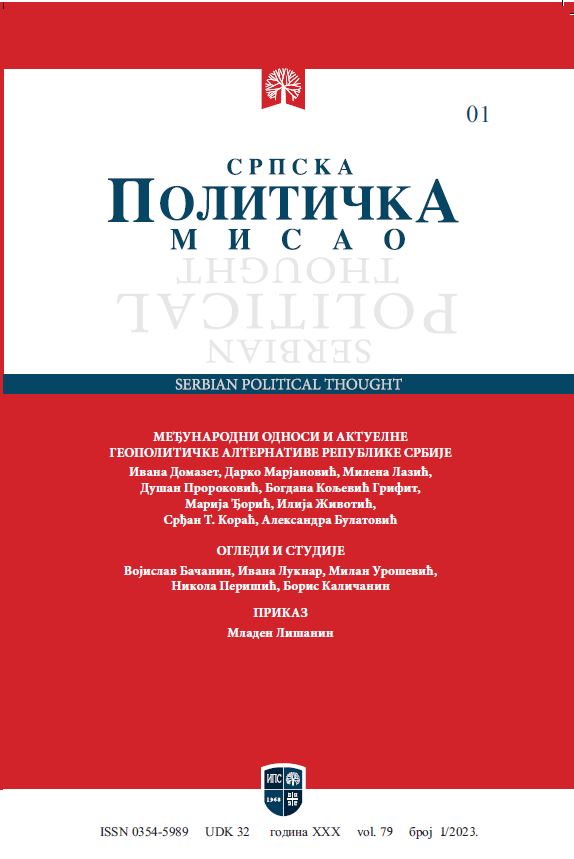RUSSIA'S POSITION IN THE MULTIPOLAR WORLD AND SERBIA'S STRATEGIC OPTIONS
Abstract
By relying on realistic theories of international relations, using the methods of content analysis, synthesis and comparison, it is possible to monitor and prove the phenomenon of establishing a balance of power in contemporary international relations. One of the key factors in that process is certainly the Russian Federation. The aspiration to redefine the post-Cold War international order and to shape a new one - multipolar and polycentric, is noticeable in Russia's strategies, as well as in the appearances of officials and concrete actions. Undoubtedly, Russia is positioning itself as one of the independent poles in the changing structure of the world political system, which is why it is necessary to consider the strategic options of the Republic of Serbia in that context. The paper consists of five parts. The introductory part is dedicated to the presentation of the framework - methodological and theoretical, as well as key concepts. The second part explains the structure of the world political system and the phenomenon of balance of power, while the third part specifically shows this through the current (foreign policy) positioning of Russia (influence on the transformation of the world political system and balance of power). The fourth part analyzes Russian - Serbian relations, their quality and content, while the fifth part discusses the strategic options of the Republic of Serbia. The time frame of the research is limited to the period from 2008 and the beginning of the global financial-economic crisis until today. For the purposes of the research, contemporary political science, security, economic, legal and historiographical literature was used, as well as primary sources related to decisions of international organizations, institutions of Russia and Serbia, as well as statements of officials relevant to this paper.
References
Janković, Slobodan. 2022. „World Trends From 2022,“ Српска политичка мисао 77(3/2022): 179 – 200.
Jović – Lazić, Ana and Ivona Lađevac. 2018. „Odnosi Srbije i Rusije – uticaj na međunarodni položaj naše zemlje“, In Srbija i svet u 2017. godini, eds. Dušan Proroković, Vladimir Trapara, 173 – 195. Beograd: Institut za međunarodnu politiku i privredu.
Комиссина, И. Н. и А. А. Куртов. 2006. „Шанхайская организация сотрудничества“, In Россия в Азии: проблемы взаимодействия, ур. К. А. Кокарев, 251 – 316. Москва: Изд-во Российского института стратегических исследований.
Концепция внешней политики Российской Федерации. 2013. Москва: Президент Российской Федерации.
Концепция внешней политики Российской Федерации. 2015. Москва: Президент Российской Федерации.
Lo, Bobo. 2010. Russia, China and the United States: From Strategic Triangularism to the Post – modern Triangle. Bruxelles/Paris: Security Studies Center.
Милинчић, Љубинка. 2007. “Хладан туш у Минхену.“ НИН, бр. 2929, 15. фебруар 2007: 6 - 7.
Miršajmer, Džon. 2009. Tragedija politike velikih sila. Beograd: Udruženje za studije Sjedinjenih Država u Srbiji.
Muray, Donette and David Brown (Eds.). 2012. Multipolarity in the 21st Century: A New World Order. London: Routledge.
Nedić, Pavle and Marko Mandić. 2022. „Američko – rusko približavanje: (ne)moguć pravac za američku spoljnu politiku,“ Politika nacionalne bezbednosti XII(21), 2/2012: 139 – 157.
Ponomareva, Elena. 2020. „Quo Vadis, Serbia?” Russia in Global Affairs 69(1): 158 - 179.
Proroković, Dušan. 2020. “Russian Vector in Serbian Politics: Impact and outcomes on regional relations”, In Security challenges and the place of the Balkans and Serbia in a changing World, eds. Ana Jović – Lazić, Alexis Troude, 196 - 211. Belgrade: Institute of International politics and economics – Faculty of Security Studies at the University of Belgrade.
Пророковић, Душан. 2018. Ера мултиполарности. Београд: Службени гласник.
Пророковић, Душан. 2022. „Моћан одговор Кине Западу – печат на крај доминације.“ Радио Спутник, 13.02.2022. Last access: August 30, 2022. https://rs.sputniknews.com/20220213/trazili-ste-gledajte-mocan-odgovor-kine-zapadu--pecat-na-kraj-dominacije-video-1134305423.html
Пророкович, Душан. 2022. „Конец эпохи.“ Известия, 14.03.2022. Last access: Sepetmeber 5, 2022. https://iz.ru/1303593/dushan-prorokovich/konetc-epokhi
Putin, Vladimir. 2017. „Predlagao sam Klintonu da Rusija uđe u NATO.“ Danas, 12.06.2017. Last access: September 1, 2022. https://www.danas.rs/svet/putin-predlagao-sam-klintonu-da-rusija-udje-u-nato/.
Putin, Wladimir. 2021. „Offen sein, trotz der Vergangenheit.“ Zeit, 22.06.2021. Last access, September 3, 2022. https://www.zeit.de/politik/ausland/2021-06/ueberfall-auf-die-sowjetunion-1941-europa-russland-geschichte-wladimir-putin?utm_referrer=https%3A%2F%2Fwww.google.com%2F
Стратегија националне безбедности, 2019. Београд: Министарство одбране Републике Србије.
Суслов, Дмитрий. 2022. „Выбор сделан? Балканы в контексте геополитического противостояния России и Запада“ излагање на конференцији „Балканы в свете актуального состояния отношений России и Запада“ организованој од стране Фонда Горчакова и Института за међународну политику и привреду у он – лајн формату 29.03.2022. године. Last access: September 3, 2022. https://www.youtube.com/watch?v=6SOZSgQKKJs&t=12452s (излагање проф. др Димитрија Суслова може се погледати у интервалу од 17:11 до 38:15).
Waltz, Keneth. 1979. Theory of International Relations. Reading: Addison – Wesley.

